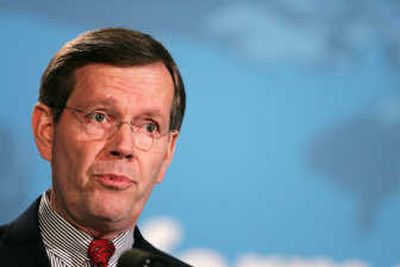Bush creates panel to make imports safer

WASHINGTON – President Bush created a Cabinet-level panel Wednesday to improve the safety of imported food and other products, responding to concerns raised after tainted toothpaste and pet food reached the United States from China.
He named Michael Leavitt, secretary of Health and Human Services, head of the panel and gave it 60 days to review U.S. regulations and safety procedures in other countries and come up with ways to ensure the quality of imports.
The issue is a difficult one for the Bush administration. On one hand, the president, a proponent of free trade, favors developing a U.S. market in an economically thriving China. On the other, he cannot ignore the spate of reports on shoddy safety precautions and possible deceit in Chinese manufacturing and food processing.
With U.S. officials and consumers growing wary of Chinese goods in recent weeks, China has undertaken public efforts to restore confidence in its products.
Last month, the Food and Drug Administration said it would block Chinese catfish, basa, dace, shrimp and eel, after tests of the farmed seafood found contamination with unapproved drugs.
Toxins have also been found in Chinese exports of juice and toothpaste. And Chinese tires have been recalled for safety reasons.
“This is not a slap at China,” White House press secretary Tony Snow said. “We take food imports from 150 countries around the world and we monitor them all.”
At the same time, he acknowledged that it was possible, in the words of one questioner, “to connect the dots to China.”
The group’s makeup reflects the diverse government agencies that play a role in bringing food and other goods from foreign manufacturers into the American home, regulate the trade, and deal with its repercussions.
In addition to Leavitt, Bush named the heads of seven Cabinet departments to the panel – the secretaries of State, Treasury, Agriculture, Commerce, Transportation, and Homeland Security, and the attorney general – as well as the director of the Office of Management and Budget, the U.S. Trade Representative, the administrator of the Environmental Protection Agency, and the chairman of the Consumer Product Safety Commission.
By bringing the group into the White House and setting out its mandate in person, Bush heightened the panel’s visibility.
But what the group can accomplish is unclear.
Consumer groups and industry representatives say that unless the government is willing to significantly boost spending to hire more inspectors and regulators – and give them greater powers – there is little that can be done to improve safeguards for imported goods.
The Food and Drug Administration, which is responsible for all food imports except meat and poultry, has only 625 inspectors to monitor the entire food supply, whether home-grown or shipped from overseas.
FDA inspectors are assigned according to a triage system that tries to anticipate risk. All in all, less than 1 percent of food imports are inspected.